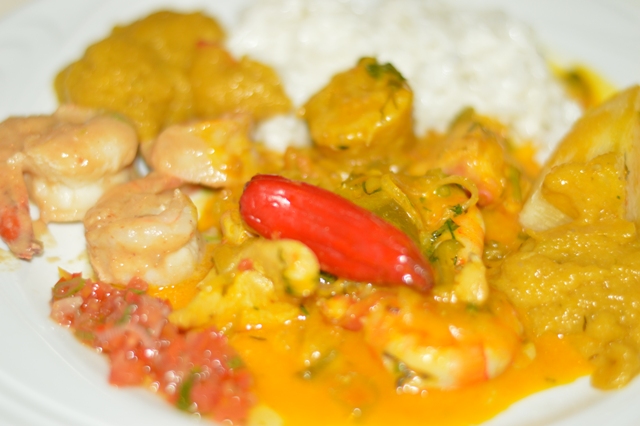The food we encounter on our travels is for many of us an essential ingredient of our holiday. If you’re one of those people who love experimenting with local food, the city of Salvador in the north-east of Brazil has many treats in store for you. As the largest city in the state of Bahia and home to the largest concentration of Brazilians of African descent, it is here that you’ll find a variety of tasty traditional dishes made up from combinations of ingredients originating from three distinct sources: the South American continent, Africa and from Portugal and its former colonies.
So what food can you expect to sample on a visit to Salvador? Many dishes you’ll encounter are typical of Bahia while others are well known across Brazil, but there are two dishes that you’re likely to encounter and that are considered the most celebrated examples of Bahian cuisine.
Moqueca
This is a rich fish stew that comes packed with flavour. You’ll find prawns, white fish, coconut milk, onions, garlic, coriander, peppers and tomato, while holding it all together is the dende (palm) oil that is used in pretty much all Bahian cooking. As a first-timer the flavours hinted at something between a mild Thai dish and an Indian fish curry, but perhaps it would be unfair to link it to any other influences – the moqueca is a 100% Brazilian creation.
In true Bahian style a moqueca is slow-cooked and you shouldn’t arrive at the restaurant starving as you might have to wait a while for a good moqueca. Your patience however will be well rewarded.
Most restaurants offer a moqueca that comes as a portion for two, typically served with a generous helping of rice.
Acarajé
This is the most popular form of street food in Salvador and in many parts of the city you’ll find people sitting out in the evening with a portion of Acarajé and a beer in hand. It is essentially a ball of black-eyed peas deep fried in palm oil and the snack is served with a tomato salad, hot sauce and fried prawns.
The dish originates from west Africa and it made its way over to Brazil during the years of the slave trade, over time being modified to include local ingredients. Its African origins are still evident in the close association between acarajé and Candomblé, the religion practised by a large proportion of Salvador’s population. If you visit a terreira (temple) for a ceremony you’ll most likely find acarajé served during proceedings.
In the centre of Salvador look out for the ladies dressed in traditional white dresses who serve acarajé from street carts around the city. It’s cheap and filling and offers an instantly accessible encounter with an important element of Bahian culture. Bom apetite!





